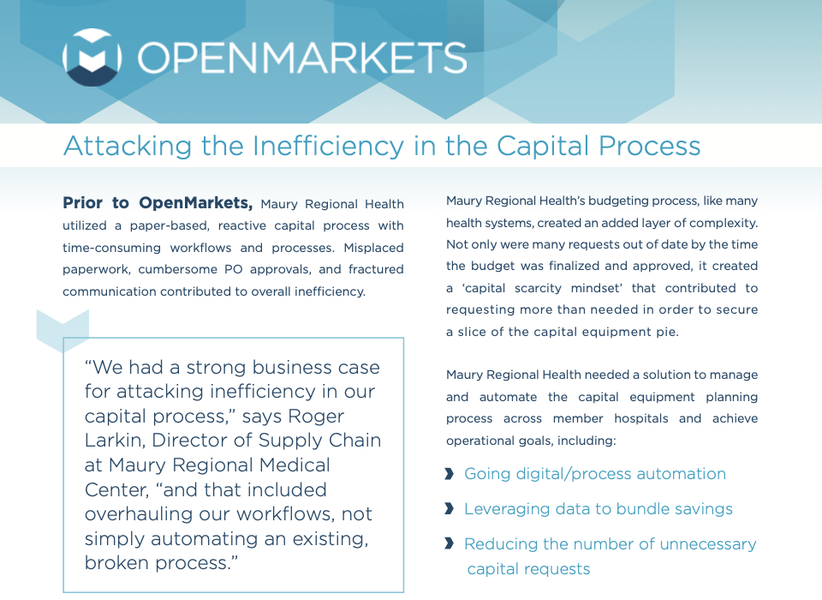Prior to OpenMarkets, Maury Regional Health utilized a paper-based, reactive capital process with time-consuming workflows and processes. Misplaced paperwork, cumbersome PO approvals, and fractured communication contributed to overall inefficiency.
Maury Regional Health’s budgeting process, like many health systems, created an added layer of complexity. Not only were many requests out of date by the time the budget was finalized and approved, it created a ‘capital scarcity mindset’ that contributed to requesting more than needed in order to secure a slice of the capital equipment pie.
Maury Regional Health needed a solution to manage and automate the capital equipment planning process across member hospitals and achieve operational goals, including:
-
Going digital/process automation
-
Leveraging data to bundle savings
-
Reducing the number of unnecessary capital requests
“We had a strong business case for attacking inefficiency in our capital process,” says Roger Larkin, Director of Supply Chain at Maury Regional Medical Center, “and that included overhauling our workflows, not simply automating an existing, broken process.”
The Solution: OpenMarkets CAP Connect™
OpenMarkets CAP Connect™, a cloud-based capital equipment budgeting and procurement software solution, was introduced to the Maury Regional Health team and rolled out across member hospitals and clinics.
We were looking for a more strategic approach to purchasing and CAP Connect has empowered our member hospitals and their sourcing teams. Having one central, transparent platform for capital budgeting, workflow, requisitioning, supplier research and data-driven purchasing pays dividends for our health system,” explains Larkin.
Going Digital/Process Automation
Transitioning to digital and automating the PO workflow immediately reduced the steps required to create, process, and approve requests.
“With CAP Connect we estimate that we cut the time it takes to process a capital request in half,” says Larkin.

Leveraging Data
The leaders within OR, imaging, and IT – the departments that generate the most capital equipment requests – have more visibility on what they need to buy and what their colleagues at other facilities need to buy which translates to proactive versus reactive decisions. Multi-system data from OpenMarkets CAP Connect can identify volume- based opportunities.
“Having access to data in real time has reduced our capital spend by enabling our team to negotiate more effectively,” adds Larkin.
In one instance, the Maury Regional Health team recognized a volume-based opportunity with a large imaging equipment supplier. By aggregating and committing to line item volume, Maury was able to achieve significant savings.
Minimizing Capital Requests
Historically, the budgeting process led to placeholder requests and more requests than necessary in order to get something to stick. If something on the list was prioritized and approved, it was purchased even though the need may have shifted, or a one-off request could have bundled later in the year to realize savings.
“We knew that a centralized platform was important for visibility, but we didn’t expect that we would change behaviors. Trust in the capital process means that people only ask for what they need. Frustrations are lower and across the board, everyone is happier,” says Larkin. “In a very short time, our team has transitioned from tactical to strategic. The benefits of CAP Connect extend well beyond our procurement department. Today, we also support the diverse needs within our organization including finance, operational managers and the C-suite. This is the best software and process implementation I’ve done in my career.”

Download a copy of the Case Study here





